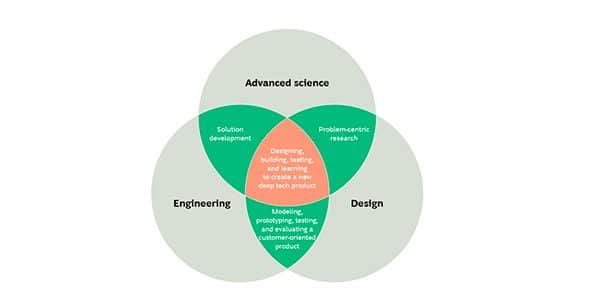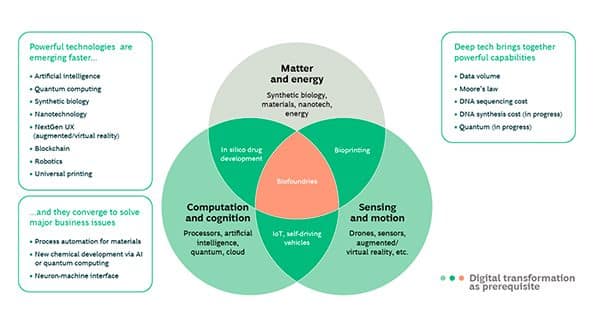
In the last few days two prominent entrepreneurs, Richard Branson of Virgin Galactic and Jeff Bezos, founder of Amazon and the Blue Origin aerospace business, have boarded their respective companies’ rockets for commercial –or promotional– voyages with private passengers. It is symptomatic of the privatisation of the space race, although the major powers are getting increasingly involved in it too. Their ultimate goal is not so much tourism as mining, starting with the Moon and Mars, prospecting for rare earths and other strategic minerals. Elon Musk is also going to board one of the rockets launched by his Space X company. The other highly successful ‘physical’ project of recent months involves the vaccines against COVID-19, with a new method, the use of messenger RNA, opening up new horizons in the fight against other pandemics. And then there are the extremely costly advanced microprocessor factories that are being built in the US and elsewhere, including the possibility of one built by Intel in Europe, to reduce dependence on foundries in Taiwan and South Korea, amid chip shortages that have seen car assembly lines in Europe, Japan and elsewhere grinding to a halt. Although in the final analysis everything has a physical basis, these grand technological projects are not purely digital (requiring bits) or intangible, but consummately material (requiring bits and atoms). They would not have been achieved without the headway that has been made in artificial intelligence. This is what a report from the Boston Consulting Group and Hello Tomorrow refers to as ‘deep tech’, the new ‘great wave of innovation’.

Deep tech can ‘transform the world as the Internet did’, according to the report. Investment in this area in the US has grown fourfold since 2016 in sectors such as synthetic biology, advanced materials, photonics and electronics, drones and robotics, and quantum computing, in addition to artificial intelligence (AI). Indeed, the report argues that there is no such thing as a deep technology, only a deep tech approach.
Deep tech companies share four characteristics: they are oriented towards problems in need of solutions (they do not start with the technology and then look for the possibilities or what can be solved); they situate themselves at the convergence of approaches (science, engineering and design) and technologies (96% of deep tech ventures in the US use at least two technologies and 66% use more than one advanced technology); they centre around three clusters (matter and energy, computation and cognition, and sensing and motion); and they inhabit a complex ecosystem. Eighty-three per cent manufacture a product with a hardware component, including sensors and large computers. It is part of a new industrial era. These entrepreneurial ventures rely on an ecosystem of closely-linked actors. They cannot be undertaken in a garage, because they involve hundreds or thousands of people in dozens of universities and research laboratories. The report ranks computing and electronics, followed by healthcare in second place (exceeding vehicle manufacturing) as the largest industries in terms of R&D spending, which are considerable. Moderna and the alliance of BioNTech and Pfizer used genome sequencing to get their respective COVID-19 vaccines to the market in less than one year. These companies, which achieved a great deal in a short time, benefitted from the efforts of many others, in academia, in large corporations, as well as the support of the public sector. All these, together with nation states, are fundamental players in this wave of big tech already underway in the US, China and elsewhere, as well as the EU and its member states.
The authors of the report discern what they call four ‘moments of truth’ when it comes to establishing new paradigms, which this seems to be: the Copernicus moment (how to frame the paradigm: what is the problem and could reality be different?); the Newton moment (involving the theory: how can this be made possible?); the Armstrong moment (taking the first step: can it be built today?); and the Asimov moment (involving changing reality: what does it need to become the new normal?).
Part of deep tech is the revolution in electric cars and semi-autonomous cars, mainly associated with Tesla. Another is Elon Musk’s other great project: encircling the Earth with nano-satellites –he has already sent up 1,500 of the almost 12,000 planned for half-way through this decade–. The idea is to do away with the need for terrestrial infrastructure and provide paid-for access to broadband Internet (not cheap, at around €100 per month) to the remotest, and not so remote, places, where fibre-optic cables and 5G cannot reach, including depopulated parts of Spain. His venture is named Starlink, an offshoot of SpaceX, with an investment of US$30 billion, which he hopes to recoup.
As far as the new space race is concerned, it has been boosted by the fact that the Moon, Mars and outer space in general have lost their status as public goods. The 1967 treaty on the subject –which, it has to be said, was becoming distinctly outdated– had been progressively eroded. In April 2020, in the midst of the COVID-19 lockdown, when the world had its eyes cast down rather than up, the then US President, Donald Trump, signed an executive order (titled ‘Encouraging international support for the recovery and use of space resources’) unilaterally permitting the private exploitation of natural resources on the Moon, something it applauded. It states that ‘Americans should have the right to engage in commercial exploration, recovery, and use of resources in outer space’, pointing out that the US had never signed the 1979 agreement known as the Moon Treaty, which defines the Moon and its natural resources as a ‘common heritage of mankind’, subject to international law. In fact, in 2015 the US Congress enacted a law that explicitly permits US companies to use resources from the Moon and asteroids. Joe Biden has not overturned the order, or stated any intention of doing so, at least for now.
The race for deep tech, in which the major corporations are now engaged, will bring immense opportunities. And challenges. For Europe, there will be what a European Council on Foreign Relations (ECFR) analysis, by Ulrike Franke and Jose Ignacio Torreblanca, calls ‘geo-tech politics’, entailing the need for a new EU ‘tech compact’. Technology is important not only economically but also because of the leverage it provides in terms of power. And in deep tech, the EU is lagging behind, despite boasting its own major capabilities, for example in space exploration, nano-satellites and biotechnology. Space exploration is going to assume increasing importance. Even Spain has floated setting up the Spanish Space Agency, in coordination with the European Space Agency. All this goes well beyond aspiring to acquire digital sovereignty, as is evident from the coronavirus vaccines and the satellite and semiconductor industries, among other fields linked to deep tech. It is sure to have all manner of consequences. Deep consequences.



